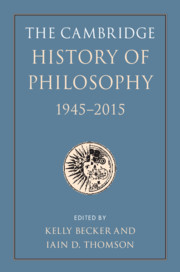Book contents
- The Cambridge History of Philosophy, 1945–2015
- The Cambridge History of Philosophy, 1945–2015
- Copyright page
- Contents
- Contributors
- Preface and Acknowledgments
- Introduction
- Part I Analytic Philosophy
- Section One Language, Mind, Epistemology
- Section Two Logic, Metaphysics, Science
- Section Three Analytic Moral, Social, and Political Philosophy
- 16 The Revival of Virtue Ethics
- 17 Kantian Ethics
- 18 Consequentialism and Its Critics
- 19 The Rediscovery of Metanormativity
- 20 Constitutivism
- 21 John Rawls’s Political Liberalism
- 22 The Twilight of the Liberal Social Contract
- 23 Feminist Philosophy and Real Politics
- Section Four Analytic Aesthetics and Philosophy of Religion
- Part II Continental Philosophy
- Part III Bridge Builders, Border Crossers, Synthesizers, and Comparative Philosophy
- Part IV Epilogue: On the Philosophy of the History of Philosophy
- References
- Index
17 - Kantian Ethics
from Section Three - Analytic Moral, Social, and Political Philosophy
Published online by Cambridge University Press: 08 November 2019
- The Cambridge History of Philosophy, 1945–2015
- The Cambridge History of Philosophy, 1945–2015
- Copyright page
- Contents
- Contributors
- Preface and Acknowledgments
- Introduction
- Part I Analytic Philosophy
- Section One Language, Mind, Epistemology
- Section Two Logic, Metaphysics, Science
- Section Three Analytic Moral, Social, and Political Philosophy
- 16 The Revival of Virtue Ethics
- 17 Kantian Ethics
- 18 Consequentialism and Its Critics
- 19 The Rediscovery of Metanormativity
- 20 Constitutivism
- 21 John Rawls’s Political Liberalism
- 22 The Twilight of the Liberal Social Contract
- 23 Feminist Philosophy and Real Politics
- Section Four Analytic Aesthetics and Philosophy of Religion
- Part II Continental Philosophy
- Part III Bridge Builders, Border Crossers, Synthesizers, and Comparative Philosophy
- Part IV Epilogue: On the Philosophy of the History of Philosophy
- References
- Index
Summary
Kant’s ethics has played a prominent role in discussions about the nature and scope of morality, moral obligation, and moral rightness since the publication of its first systematic expression in Kant’s Groundwork of the Metaphysics of Morals in 1785. Although eclipsed in popularity by the utilitarian moral theory that flourished in the late nineteenth and early twentieth centuries, Kant’s views have remained a constant source of inspiration and debate for contemporary moral and political theorists. By highlighting some of the most significant developments in the field of Kantian ethics during the past seventy years, this chapter aims to reaffirm Kant’s pride of place as one of the most influential moral theorists in the history of philosophy.
- Type
- Chapter
- Information
- The Cambridge History of Philosophy, 1945–2015 , pp. 237 - 248Publisher: Cambridge University PressPrint publication year: 2019

